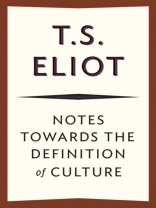This critique of modern society argues that culture must be organic, and cannot be planned or imposed. The word culture has been widely and erroneously employed in political, educational, and journalistic contexts. In helping to define a word so greatly misused, T. S. Eliot contradicts many of our popular assumptions about culture, reminding us that it is not the possession of any one class but of a whole society—and yet its preservation may depend on the continuance of a class system, and that a “classless” society may be a society in which culture has ceased to exist. Surveying the post–World War II world, Eliot finds evidence of decay in cultural standards in every department of human activity, and expects the phenomenon to continue. He suggests that culture and religion have a common root—and if one decays, the other may die too. In observing the superpowers of his day and the course of recent history, he reminds us that “the Russians have been the first modern people to practise the political direction of culture consciously, and to attack at every point the culture of any people whom they wish to dominate.” The appendix includes Eliot’s broadcasts to Europe, ending with a plea to preserve the legacy of Greece, Rome, and Israel, and Europe’s legacy throughout the last two thousand years. “Behind the urbanity, the modesty, the mere good manners of Mr. Eliot’s exposition, one cannot mistake the force and significance of what he has to say, or ignore that it constitutes a fundamental attack on most of our assumptions on the subject.” —The Spectator
T. S. Eliot
Notes Towards the Definition of Culture [EPUB ebook]
Notes Towards the Definition of Culture [EPUB ebook]
ซื้อ eBook เล่มนี้และรับฟรีอีก 1 เล่ม!
ภาษา อังกฤษ ● รูป EPUB ● ISBN 9780544358522 ● สำนักพิมพ์ Houghton Mifflin Harcourt ● การตีพิมพ์ 2014 ● ที่สามารถดาวน์โหลดได้ 3 ครั้ง ● เงินตรา EUR ● ID 3367026 ● ป้องกันการคัดลอก Adobe DRM
ต้องใช้เครื่องอ่านหนังสืออิเล็กทรอนิกส์ที่มีความสามารถ DRM












